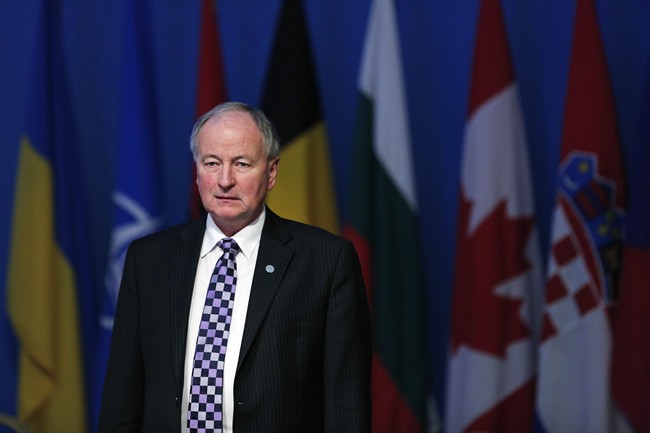OTTAWA – Foreign Affairs Minister Rob Nicholson is expressing muted optimism that U.S. Secretary of State John Kerry’s meeting with Russian President Vladimir Putin could open the door to resolving the Ukraine crisis.

Nicholson got a briefing from Kerry at the meeting of NATO foreign ministers in Turkey, which wrapped on Thursday.
Kerry had met Putin in Russia two days earlier for the first time since the Ukraine crisis erupted last year.
There was no firm breakthrough but Kerry was focused on getting Russia to abide by a February ceasefire agreement with Ukraine.
Nicholson said the meeting may have marked “the beginning of some progress.”
But Nicholson said Kerry remains in lockstep with Canada and its allies: that Russia must get out of Ukraine, and that it will only be judged by what it does, not what it says.
“They heard it again and I guess it’s everybody’s hope, the secretary’s and NATO’s, that Putin gets the message,” Nicholson said.
“I believe that the conversation between the two of them was very frank and that the secretary was completely candid with respect to the expectations of the alliance.”
Nicholson said the foreign ministers also affirmed their desire to see NATO expand its 28-country membership, a policy that many analysts say Russia has found provocative. In particular, that would mean welcoming Montenegro and Georgia.
In 2008, NATO put its plans to admit Georgia and Ukraine on the back burner.
- Four injured after military horses break loose, stampede in London, U.K.
- Canada refused to repatriate woman from ISIS camp because she can’t be arrested: internal memo
- Russia vetoes UN resolution to prevent nuclear arms race in space
- Why U.S. colleges are turning to police to quell pro-Palestinian student protests
Soon after, Russian troops entered Georgia but quickly withdrew, but the flare-up was a harbinger of the current Ukraine crisis.
Nicholson shrugged off suggestions that NATO’s continued expansion would provoke Putin.
He said he expected Montenegro’s accession to be the first order of business for the alliance.
“Georgia is continuing to pursue its application,” Nicholson said.
“Georgia is a free country. It can make up its own mind. We, of course, support that.”
Nicholson was meeting his fellow NATO ministers in the southern Turkish town of Antalya, where in addition to their talks on the continued crisis in Ukraine, the ongoing unrest in the Middle East, including in neighbouring Syria and Iraq, was also on the agenda.
They also had to deal with the request from the alliance’s three Baltic members. Estonia, Latvia and Lithuania – three former Soviet republics who gained independence in the 1990s following the collapse of the Iron Curtain – want a permanent NATO military presence in their region to deter the aggression of Russia.
Nicholson said that would have to be a future decision taken by NATO as a whole.



Comments